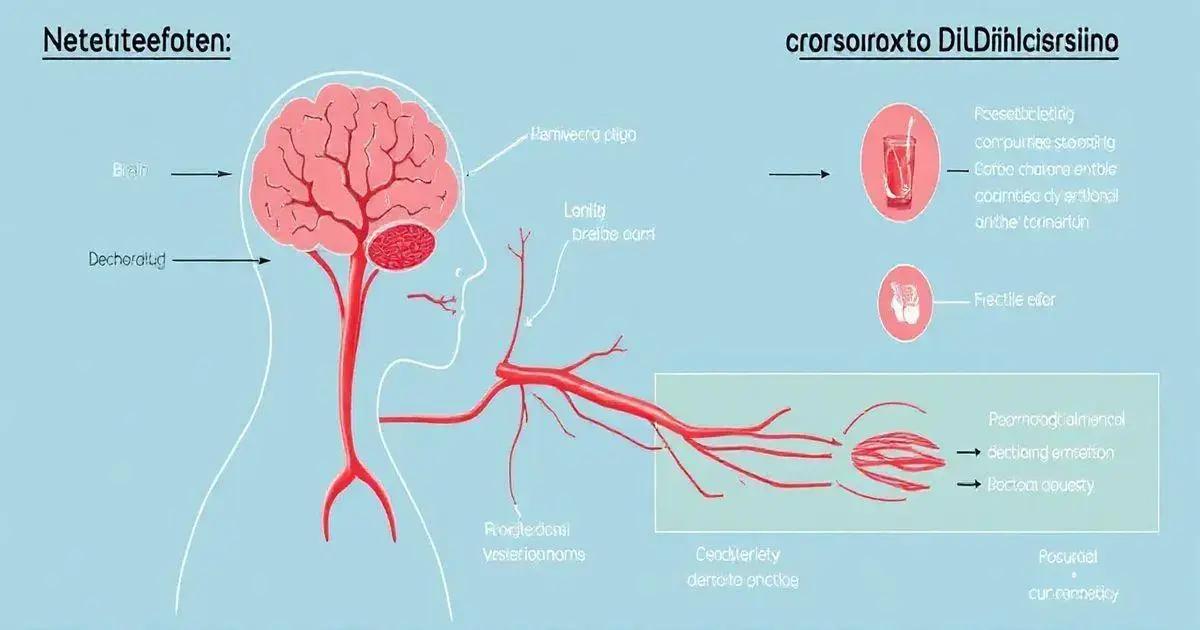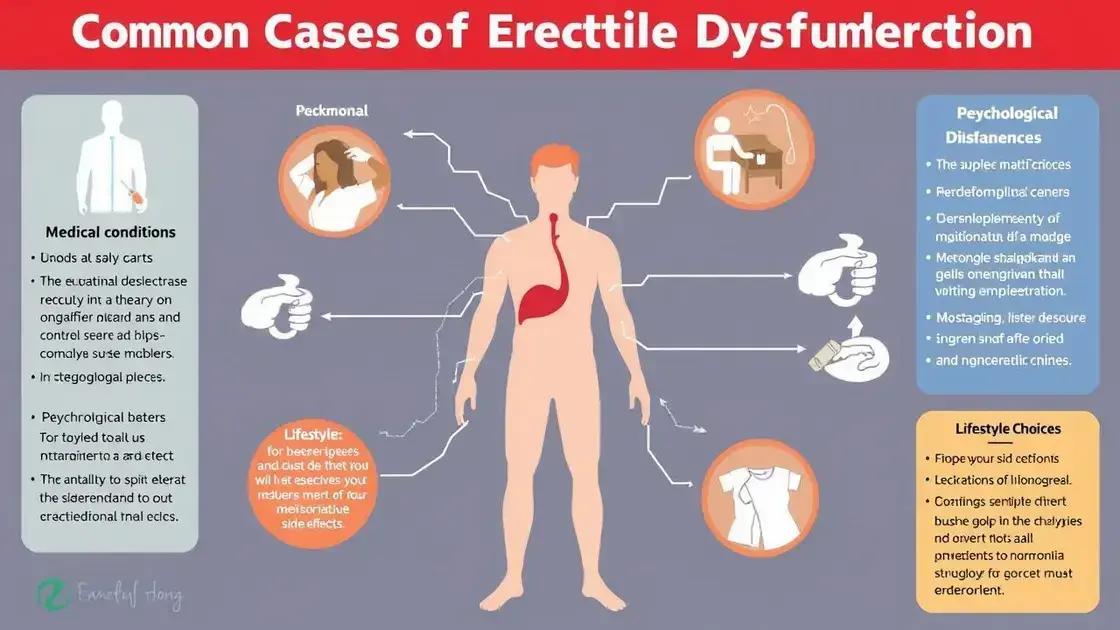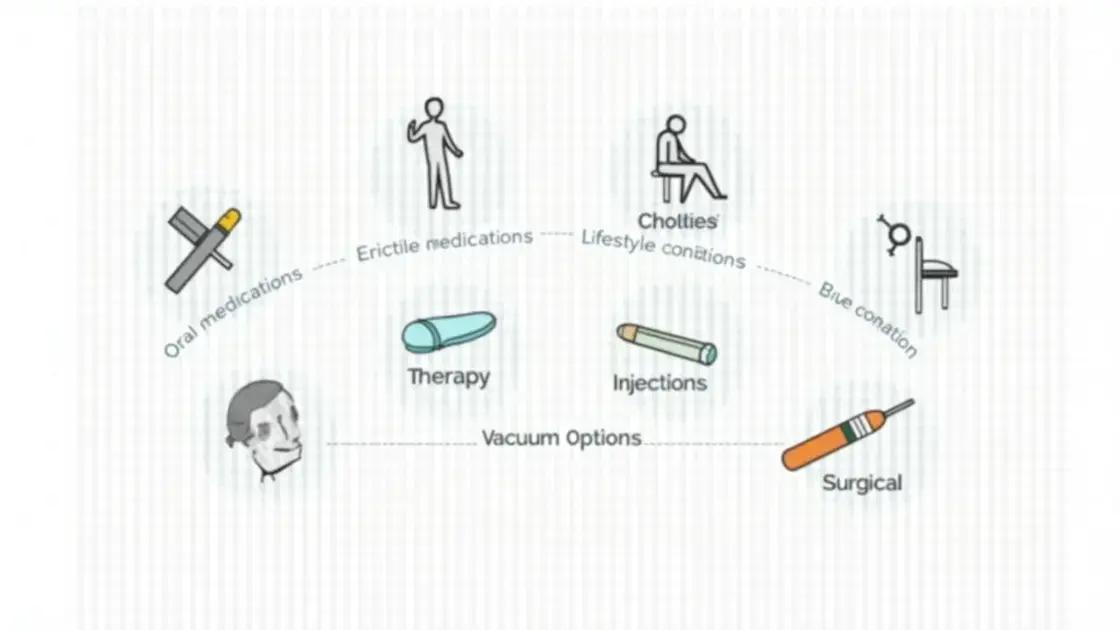Erectile dysfunction (ED) is the inability to achieve or maintain an erection and can be caused by various factors such as medical conditions, psychological issues, and lifestyle choices. Seeking effective treatments like medications, lifestyle changes, and consulting a doctor is essential for managing the condition and enhancing overall sexual health.
What is erectile dysfunction (ED)? This condition impacts many men, making it difficult to achieve or maintain an erection during sexual activity. It’s essential to understand that ED can result from various factors, including physical health issues, psychological conditions, or lifestyle choices. In this article, we’ll explore the underlying causes of erectile dysfunction, available treatments, and when it’s crucial to consult a healthcare professional. Whether you’re seeking information for yourself or a loved one, gaining knowledge about ED is a vital step towards effective management.
Understanding Erectile Dysfunction

Erectile dysfunction (ED) is a common condition that affects many men at different ages. It refers to the inability to achieve or maintain an erection sufficient for satisfying sexual activity. This issue may arise occasionally, but when it becomes a frequent problem, it can negatively impact self-esteem and relationships.
Understanding the Mechanism
To understand erectile dysfunction, it’s essential to know how erections work. An erection occurs when blood fills the penis, causing it to enlarge and become rigid. This process is usually triggered by sexual arousal and involves a complex interaction between the brain, hormones, nerves, muscles, and blood vessels.
Types of Erectile Dysfunction
ED can be classified into two types: primary and secondary. Primary ED refers to men who have never been able to achieve an erection, while secondary ED is when men who previously had normal erections experience difficulties.
Risk Factors
Several factors can contribute to the development of erectile dysfunction. Age is a well-known risk factor, as the likelihood of experiencing ED increases with age. Other risk factors include obesity, smoking, excessive alcohol consumption, and certain medical conditions such as diabetes, heart disease, or high blood pressure.
Emotional and Psychological Factors
It’s important to note that erectile dysfunction is not just a physical issue. Psychological factors, such as anxiety, depression, or stress, can also lead to or worsen the condition. These emotional aspects can create a cycle where anxiety about performance leads to further ED.
Seeking Help
Understanding erectile dysfunction is the first step towards addressing it. Men experiencing ED should not hesitate to seek help from a healthcare professional. They can provide advice, diagnose any underlying conditions, and discuss potential treatment options.
Common Causes of ED

Several common causes of erectile dysfunction can affect men of all ages. Understanding these causes is essential for effective management and treatment.
1. Medical Conditions
Diabetes is one of the most frequent causes of ED. It can damage the blood vessels and nerves that are vital for achieving an erection. Other medical conditions like heart disease, high blood pressure, and high cholesterol levels can also contribute to this condition.
2. Hormonal Imbalances
Hormonal issues, such as low testosterone levels, can influence sexual function. Conditions like hypogonadism can result in decreased libido and erectile problems.
3. Psychological Factors
The mind plays a crucial role in sexual arousal. Psychological issues such as stress, anxiety, and depression can lead to or worsen ED. Performance anxiety can make the problem persist.
4. Lifestyle Choices
Certain lifestyle factors can increase the risk of developing ED. Habits such as smoking, excessive alcohol consumption, and illicit drug use are significant contributors. Maintaining a healthy weight through diet and exercise is vital for overall sexual health.
5. Medication Side Effects
Some medications can have side effects that include erectile dysfunction. Drugs for conditions like depression, anxiety, or high blood pressure can contribute to issues with achieving an erection. Always consult a doctor before stopping any medication.
Effective Treatments for Erectile Dysfunction

Effective treatments for erectile dysfunction (ED) vary depending on the underlying cause and severity of the condition. Understanding available options can help men regain their confidence and improve their sexual health.
1. Oral Medications
Many doctors prescribe oral medications as a first-line treatment for ED. Popular options include Viagra (sildenafil), Cialis (tadalafil), and Levitra (vardenafil). These medications work by increasing blood flow to the penis, making it easier to achieve and maintain an erection.
2. Lifestyle Changes
Making healthy lifestyle changes can have a significant impact on erectile dysfunction. Regular physical activity, a balanced diet, and maintaining a healthy weight can improve blood circulation and overall health. Avoiding smoking and reducing alcohol intake are also crucial steps.
3. Psychological Counseling
If psychological factors contribute to ED, therapy or counseling may be beneficial. Speaking to a mental health professional can help address issues such as anxiety, depression, or relationship troubles that could be affecting sexual performance.
4. Vacuum Erection Devices
Vacuum erection devices (VEDs) are mechanical devices that help achieve an erection. These devices consist of a plastic cylinder placed over the penis and a pump that creates a vacuum, drawing blood into the penis. Once an erection is achieved, a rubber ring is placed at the base to maintain it.
5. Penile Injections and Suppositories
For some men, penile injections or suppositories provide an effective treatment. Medications such as alprostadil are injected directly into the penis or inserted as a suppository and can help prompt an erection by increasing blood flow.
6. Surgical Options
In severe cases, surgical procedures may be necessary. Surgical treatments may include penile implants or vascular surgery to improve blood flow to the penis. These options are typically reserved for men who do not respond to other treatments.
Lifestyle Changes to Improve ED

Making lifestyle changes is a powerful way to improve erectile dysfunction (ED) and boost overall health. Here are several key changes that may help.
1. Maintain a Healthy Weight
Being overweight can contribute to erectile dysfunction. Losing excess weight through diet and exercise can improve blood flow and hormone levels, making it easier to achieve an erection.
2. Exercise Regularly
Regular physical activity is essential for good health and can help alleviate ED. Aim for at least 30 minutes of moderate exercise most days of the week. Activities like walking, swimming, and cycling can enhance circulation and lower stress.
3. Eat a Balanced Diet
A healthy diet rich in fruits, vegetables, whole grains, and lean proteins can help improve erectile function. Foods that are beneficial for heart health, like salmon, nuts, and leafy greens, also support good blood circulation.
4. Limit Alcohol and Avoid Tobacco
Excessive alcohol consumption can lead to erectile issues, so it’s best to drink in moderation. Additionally, quitting smoking can have a positive impact on blood flow and overall vascular health.
5. Manage Stress and Anxiety
High levels of stress and anxiety can negatively affect sexual performance. Practicing relaxation techniques like yoga, meditation, or deep breathing exercises can help manage stress levels effectively.
6. Get Enough Sleep
Quality sleep is crucial for maintaining healthy hormone levels, including testosterone. Aim for 7 to 8 hours of sleep per night to support your sexual health.
7. Stay Hydrated
Drinking enough water is essential for good health. Proper hydration can improve blood volume, which is important for achieving and maintaining an erection.
When to See a Doctor for ED

Recognizing when to see a doctor for erectile dysfunction (ED) is crucial for managing the condition effectively. Here are some important signs that indicate it’s time to seek medical advice.
1. Regular Occurrence of ED
If you experience ED frequently, it’s advisable to consult a healthcare provider. Occasional difficulties may not be concerning, but consistent issues could indicate an underlying condition.
2. Other Health Issues
Men who have existing health problems, such as diabetes, heart disease, or high blood pressure, should see a doctor if they start experiencing ED. These conditions can significantly affect sexual health and require medical attention.
3. Changes in Sexual Desire
A decrease in libido or changes in sexual interest can be linked to ED. If you notice these changes alongside erectile problems, it’s essential to discuss them with a healthcare professional.
4. Emotional Distress
If ED is causing emotional distress, anxiety, or relationship issues, seeking help can be beneficial. Talking to a doctor can provide reassurance and help you find appropriate treatment options.
5. Medication Side Effects
Some medications may contribute to ED. If you suspect that your medications are causing problems, consult your doctor to explore alternatives or adjustments in dosage.
6. Lifestyle Factors
If lifestyle choices, like smoking or excessive drinking, are affecting your sexual health, consulting a doctor can guide you in making healthier decisions and provide support in quitting.
7. Unexplained Symptoms
If you experience other unexplained symptoms such as pain during sex, changes in the penis, or other health issues, seeking medical help is important to ensure there’s no serious health concern.
In conclusion, understanding and addressing erectile dysfunction
ED is a common issue that many men experience, but it can significantly affect quality of life. By recognizing its causes, seeking effective treatments, and making positive lifestyle changes, men can improve their sexual health and overall well-being.
It’s essential to consult a healthcare professional when experiencing symptoms of ED to receive appropriate guidance and support. Taking action can lead to better health outcomes and enhance intimate relationships.
Whether through lifestyle adjustments or medical interventions, addressing ED is vital for reclaiming confidence and enjoying a fulfilling sex life.
FAQ – Frequently Asked Questions about Erectile Dysfunction
What is erectile dysfunction?
Erectile dysfunction (ED) is the inability to achieve or maintain an erection sufficient for satisfactory sexual performance.
What are the common causes of ED?
Common causes include medical conditions like diabetes and heart disease, hormonal imbalances, psychological factors, and lifestyle choices such as smoking and obesity.
When should I see a doctor for ED?
You should consult a doctor if you experience frequent ED, have other health issues, notice changes in sexual desire, or if ED is causing emotional distress.
What are the effective treatments for ED?
Effective treatments include oral medications, lifestyle changes, psychological counseling, vacuum erection devices, penile injections, and surgical options.
Can lifestyle changes improve ED?
Yes, maintaining a healthy weight, exercising regularly, eating a balanced diet, and avoiding tobacco and excessive alcohol can improve erectile function.
Is ED a common condition?
Yes, erectile dysfunction is a common issue that affects many men, especially as they age, but it can be treated effectively with the right approach.












